Genetic, Environmental and Cultural Influences on Human Psychology
VerifiedAdded on 2023/05/30
|10
|2667
|272
Essay
AI Summary
This essay provides a comprehensive analysis of the multifaceted influences on human psychology and personality development. It examines the roles of genetic factors, highlighting the heritability of psychological traits and the impact of DNA variations. The discussion extends to environmental factors, emphasizing the significance of early childhood experiences, parental influence, and social norms in shaping a child's cognitive abilities and moral character. Furthermore, the essay explores the impact of cultural factors, focusing on how societal values, communication patterns, and collectivist or individualistic orientations contribute to personality formation. The essay concludes by underscoring the complex interplay of these genetic, environmental, and cultural forces in shaping the diverse dimensions of human personality and intelligence. Desklib provides access to a wealth of similar solved assignments and study resources for students.
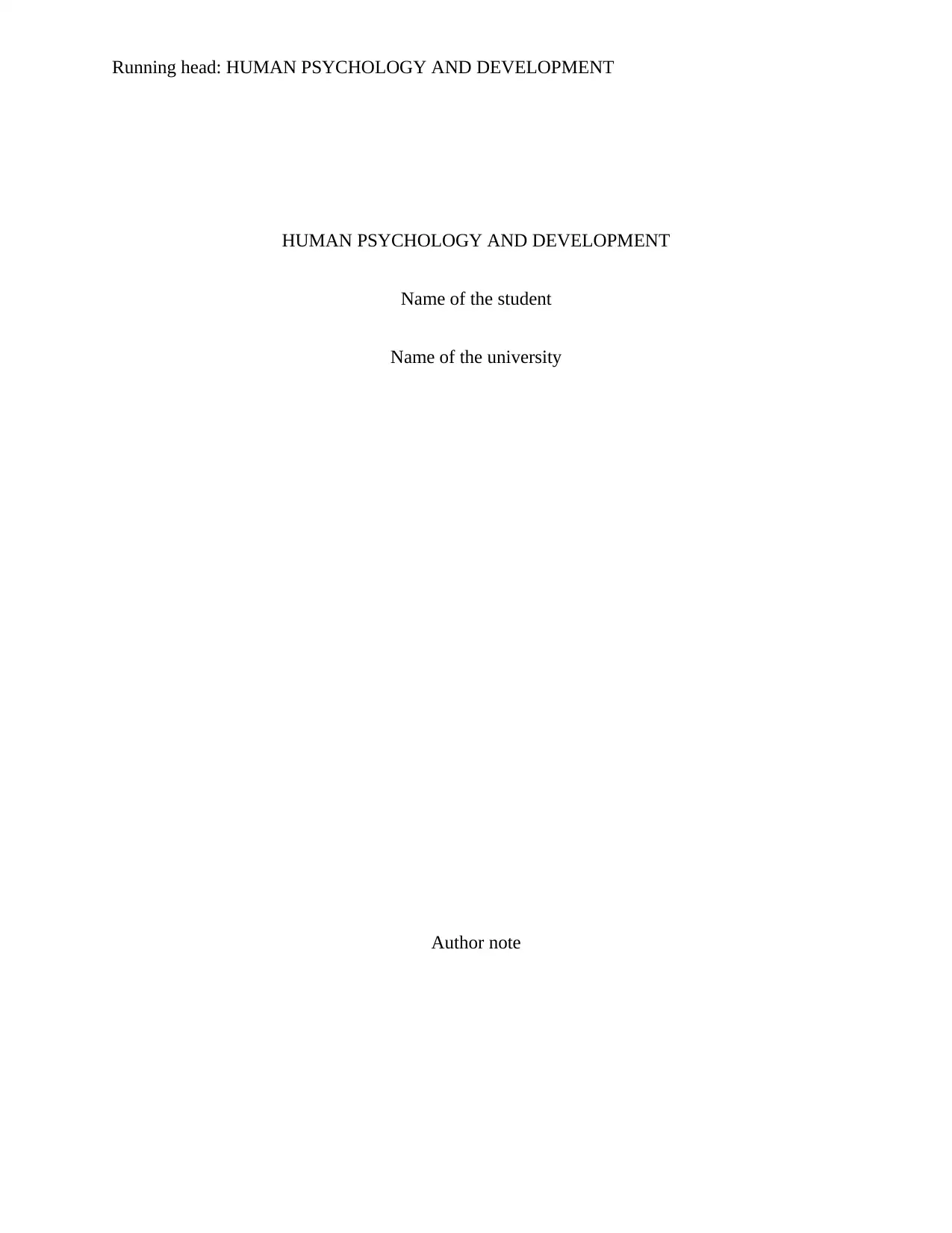
Running head: HUMAN PSYCHOLOGY AND DEVELOPMENT
HUMAN PSYCHOLOGY AND DEVELOPMENT
Name of the student
Name of the university
Author note
HUMAN PSYCHOLOGY AND DEVELOPMENT
Name of the student
Name of the university
Author note
Paraphrase This Document
Need a fresh take? Get an instant paraphrase of this document with our AI Paraphraser
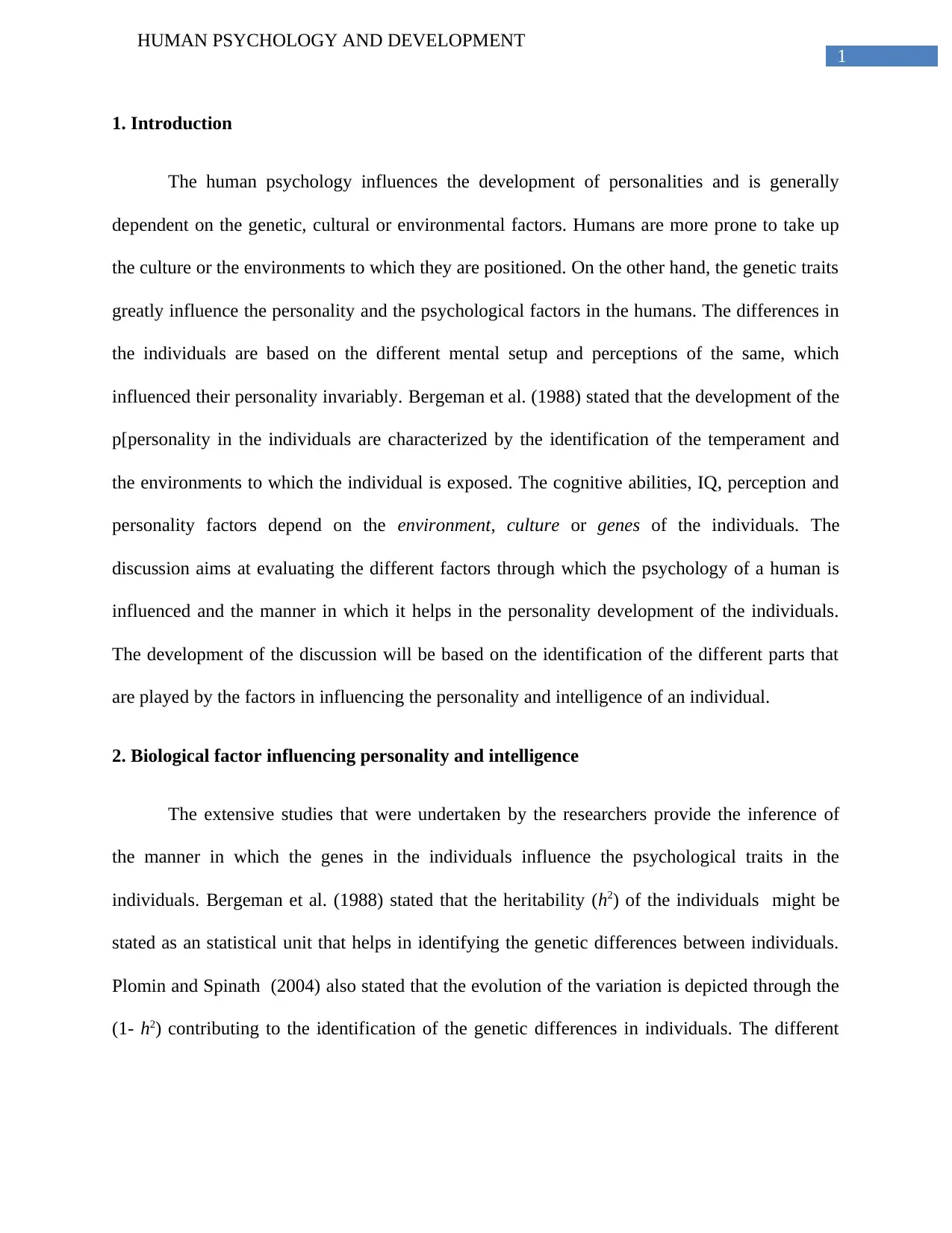
1
HUMAN PSYCHOLOGY AND DEVELOPMENT
1. Introduction
The human psychology influences the development of personalities and is generally
dependent on the genetic, cultural or environmental factors. Humans are more prone to take up
the culture or the environments to which they are positioned. On the other hand, the genetic traits
greatly influence the personality and the psychological factors in the humans. The differences in
the individuals are based on the different mental setup and perceptions of the same, which
influenced their personality invariably. Bergeman et al. (1988) stated that the development of the
p[personality in the individuals are characterized by the identification of the temperament and
the environments to which the individual is exposed. The cognitive abilities, IQ, perception and
personality factors depend on the environment, culture or genes of the individuals. The
discussion aims at evaluating the different factors through which the psychology of a human is
influenced and the manner in which it helps in the personality development of the individuals.
The development of the discussion will be based on the identification of the different parts that
are played by the factors in influencing the personality and intelligence of an individual.
2. Biological factor influencing personality and intelligence
The extensive studies that were undertaken by the researchers provide the inference of
the manner in which the genes in the individuals influence the psychological traits in the
individuals. Bergeman et al. (1988) stated that the heritability (h2) of the individuals might be
stated as an statistical unit that helps in identifying the genetic differences between individuals.
Plomin and Spinath (2004) also stated that the evolution of the variation is depicted through the
(1- h2) contributing to the identification of the genetic differences in individuals. The different
HUMAN PSYCHOLOGY AND DEVELOPMENT
1. Introduction
The human psychology influences the development of personalities and is generally
dependent on the genetic, cultural or environmental factors. Humans are more prone to take up
the culture or the environments to which they are positioned. On the other hand, the genetic traits
greatly influence the personality and the psychological factors in the humans. The differences in
the individuals are based on the different mental setup and perceptions of the same, which
influenced their personality invariably. Bergeman et al. (1988) stated that the development of the
p[personality in the individuals are characterized by the identification of the temperament and
the environments to which the individual is exposed. The cognitive abilities, IQ, perception and
personality factors depend on the environment, culture or genes of the individuals. The
discussion aims at evaluating the different factors through which the psychology of a human is
influenced and the manner in which it helps in the personality development of the individuals.
The development of the discussion will be based on the identification of the different parts that
are played by the factors in influencing the personality and intelligence of an individual.
2. Biological factor influencing personality and intelligence
The extensive studies that were undertaken by the researchers provide the inference of
the manner in which the genes in the individuals influence the psychological traits in the
individuals. Bergeman et al. (1988) stated that the heritability (h2) of the individuals might be
stated as an statistical unit that helps in identifying the genetic differences between individuals.
Plomin and Spinath (2004) also stated that the evolution of the variation is depicted through the
(1- h2) contributing to the identification of the genetic differences in individuals. The different
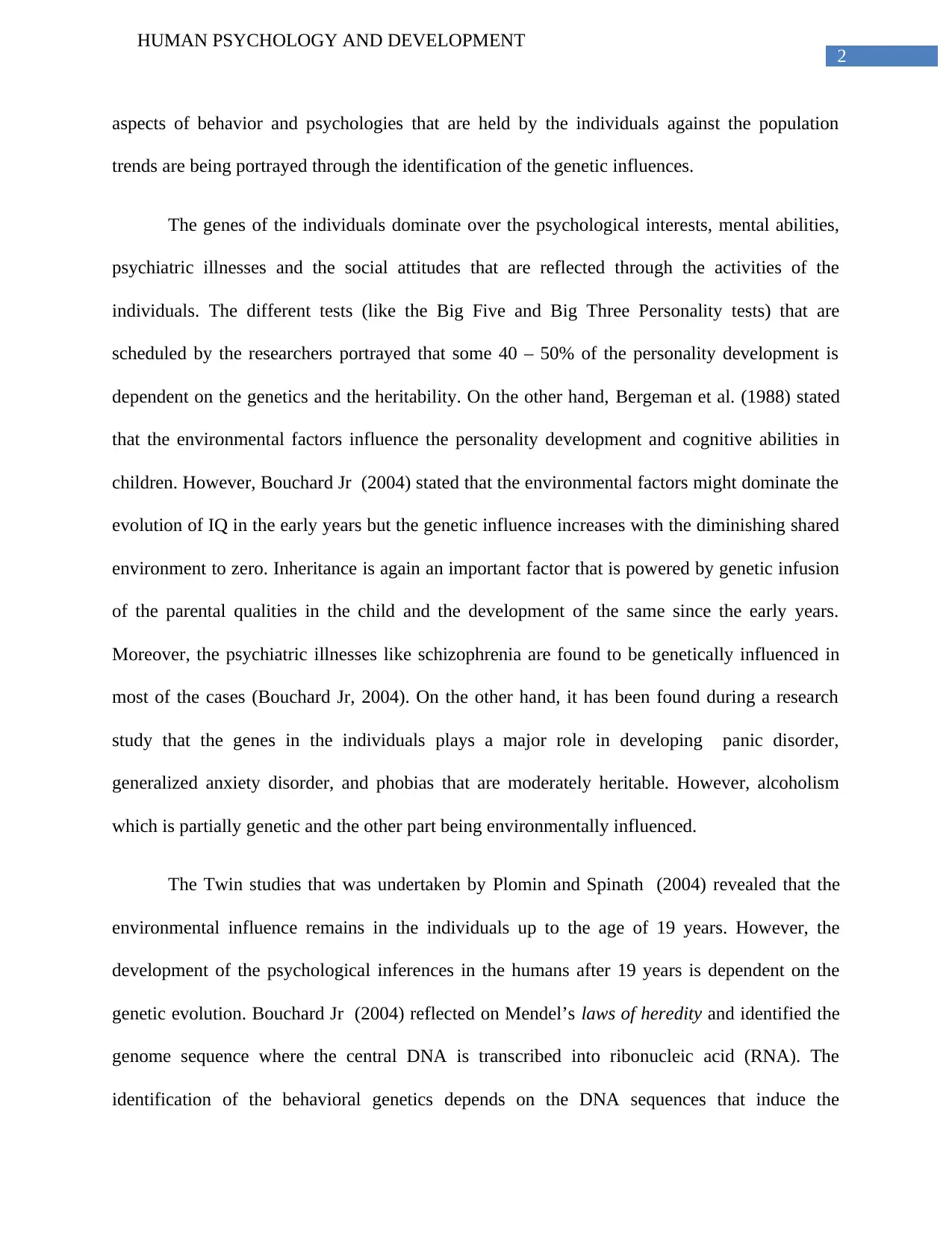
2
HUMAN PSYCHOLOGY AND DEVELOPMENT
aspects of behavior and psychologies that are held by the individuals against the population
trends are being portrayed through the identification of the genetic influences.
The genes of the individuals dominate over the psychological interests, mental abilities,
psychiatric illnesses and the social attitudes that are reflected through the activities of the
individuals. The different tests (like the Big Five and Big Three Personality tests) that are
scheduled by the researchers portrayed that some 40 – 50% of the personality development is
dependent on the genetics and the heritability. On the other hand, Bergeman et al. (1988) stated
that the environmental factors influence the personality development and cognitive abilities in
children. However, Bouchard Jr (2004) stated that the environmental factors might dominate the
evolution of IQ in the early years but the genetic influence increases with the diminishing shared
environment to zero. Inheritance is again an important factor that is powered by genetic infusion
of the parental qualities in the child and the development of the same since the early years.
Moreover, the psychiatric illnesses like schizophrenia are found to be genetically influenced in
most of the cases (Bouchard Jr, 2004). On the other hand, it has been found during a research
study that the genes in the individuals plays a major role in developing panic disorder,
generalized anxiety disorder, and phobias that are moderately heritable. However, alcoholism
which is partially genetic and the other part being environmentally influenced.
The Twin studies that was undertaken by Plomin and Spinath (2004) revealed that the
environmental influence remains in the individuals up to the age of 19 years. However, the
development of the psychological inferences in the humans after 19 years is dependent on the
genetic evolution. Bouchard Jr (2004) reflected on Mendel’s laws of heredity and identified the
genome sequence where the central DNA is transcribed into ribonucleic acid (RNA). The
identification of the behavioral genetics depends on the DNA sequences that induce the
HUMAN PSYCHOLOGY AND DEVELOPMENT
aspects of behavior and psychologies that are held by the individuals against the population
trends are being portrayed through the identification of the genetic influences.
The genes of the individuals dominate over the psychological interests, mental abilities,
psychiatric illnesses and the social attitudes that are reflected through the activities of the
individuals. The different tests (like the Big Five and Big Three Personality tests) that are
scheduled by the researchers portrayed that some 40 – 50% of the personality development is
dependent on the genetics and the heritability. On the other hand, Bergeman et al. (1988) stated
that the environmental factors influence the personality development and cognitive abilities in
children. However, Bouchard Jr (2004) stated that the environmental factors might dominate the
evolution of IQ in the early years but the genetic influence increases with the diminishing shared
environment to zero. Inheritance is again an important factor that is powered by genetic infusion
of the parental qualities in the child and the development of the same since the early years.
Moreover, the psychiatric illnesses like schizophrenia are found to be genetically influenced in
most of the cases (Bouchard Jr, 2004). On the other hand, it has been found during a research
study that the genes in the individuals plays a major role in developing panic disorder,
generalized anxiety disorder, and phobias that are moderately heritable. However, alcoholism
which is partially genetic and the other part being environmentally influenced.
The Twin studies that was undertaken by Plomin and Spinath (2004) revealed that the
environmental influence remains in the individuals up to the age of 19 years. However, the
development of the psychological inferences in the humans after 19 years is dependent on the
genetic evolution. Bouchard Jr (2004) reflected on Mendel’s laws of heredity and identified the
genome sequence where the central DNA is transcribed into ribonucleic acid (RNA). The
identification of the behavioral genetics depends on the DNA sequences that induce the
⊘ This is a preview!⊘
Do you want full access?
Subscribe today to unlock all pages.

Trusted by 1+ million students worldwide
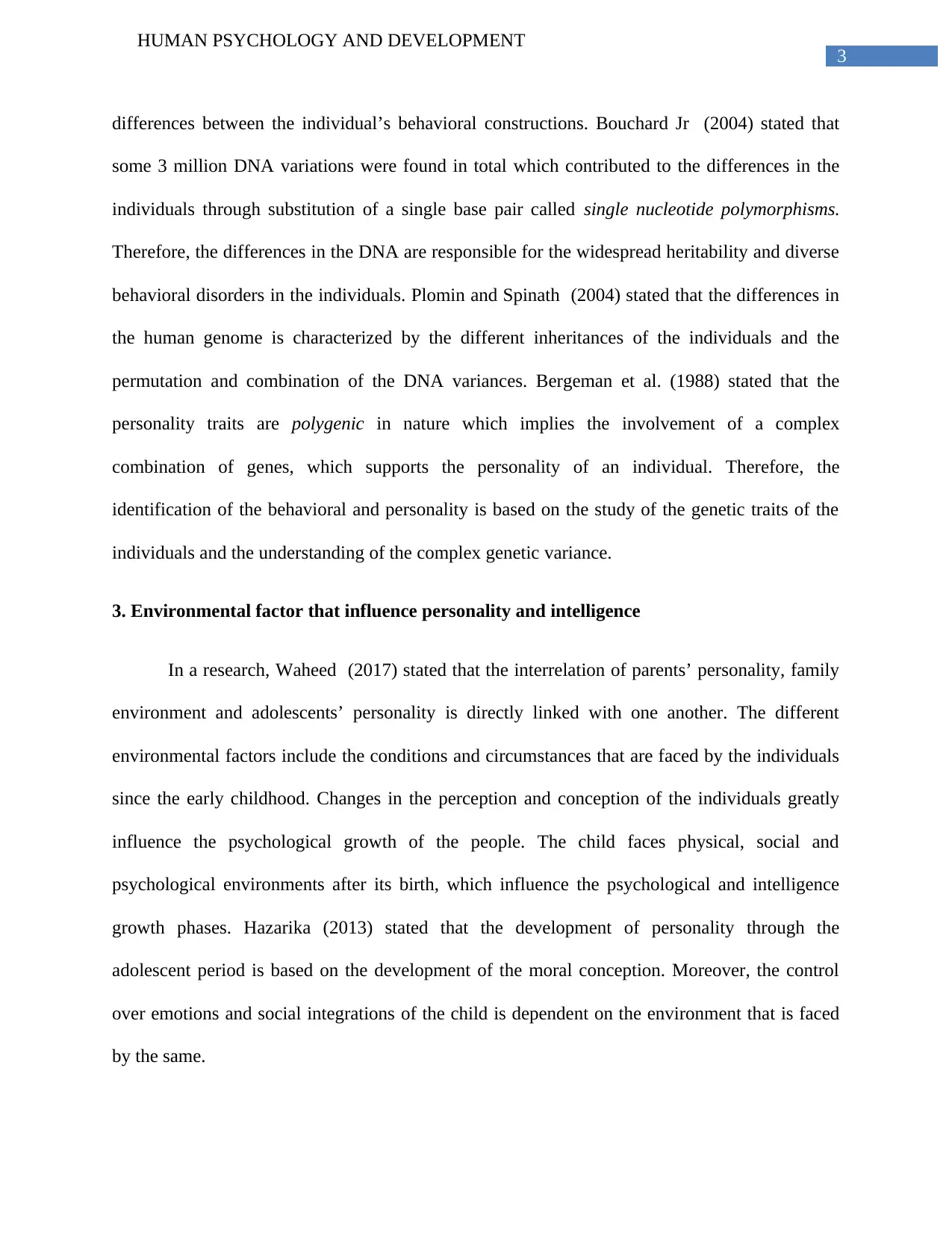
3
HUMAN PSYCHOLOGY AND DEVELOPMENT
differences between the individual’s behavioral constructions. Bouchard Jr (2004) stated that
some 3 million DNA variations were found in total which contributed to the differences in the
individuals through substitution of a single base pair called single nucleotide polymorphisms.
Therefore, the differences in the DNA are responsible for the widespread heritability and diverse
behavioral disorders in the individuals. Plomin and Spinath (2004) stated that the differences in
the human genome is characterized by the different inheritances of the individuals and the
permutation and combination of the DNA variances. Bergeman et al. (1988) stated that the
personality traits are polygenic in nature which implies the involvement of a complex
combination of genes, which supports the personality of an individual. Therefore, the
identification of the behavioral and personality is based on the study of the genetic traits of the
individuals and the understanding of the complex genetic variance.
3. Environmental factor that influence personality and intelligence
In a research, Waheed (2017) stated that the interrelation of parents’ personality, family
environment and adolescents’ personality is directly linked with one another. The different
environmental factors include the conditions and circumstances that are faced by the individuals
since the early childhood. Changes in the perception and conception of the individuals greatly
influence the psychological growth of the people. The child faces physical, social and
psychological environments after its birth, which influence the psychological and intelligence
growth phases. Hazarika (2013) stated that the development of personality through the
adolescent period is based on the development of the moral conception. Moreover, the control
over emotions and social integrations of the child is dependent on the environment that is faced
by the same.
HUMAN PSYCHOLOGY AND DEVELOPMENT
differences between the individual’s behavioral constructions. Bouchard Jr (2004) stated that
some 3 million DNA variations were found in total which contributed to the differences in the
individuals through substitution of a single base pair called single nucleotide polymorphisms.
Therefore, the differences in the DNA are responsible for the widespread heritability and diverse
behavioral disorders in the individuals. Plomin and Spinath (2004) stated that the differences in
the human genome is characterized by the different inheritances of the individuals and the
permutation and combination of the DNA variances. Bergeman et al. (1988) stated that the
personality traits are polygenic in nature which implies the involvement of a complex
combination of genes, which supports the personality of an individual. Therefore, the
identification of the behavioral and personality is based on the study of the genetic traits of the
individuals and the understanding of the complex genetic variance.
3. Environmental factor that influence personality and intelligence
In a research, Waheed (2017) stated that the interrelation of parents’ personality, family
environment and adolescents’ personality is directly linked with one another. The different
environmental factors include the conditions and circumstances that are faced by the individuals
since the early childhood. Changes in the perception and conception of the individuals greatly
influence the psychological growth of the people. The child faces physical, social and
psychological environments after its birth, which influence the psychological and intelligence
growth phases. Hazarika (2013) stated that the development of personality through the
adolescent period is based on the development of the moral conception. Moreover, the control
over emotions and social integrations of the child is dependent on the environment that is faced
by the same.
Paraphrase This Document
Need a fresh take? Get an instant paraphrase of this document with our AI Paraphraser
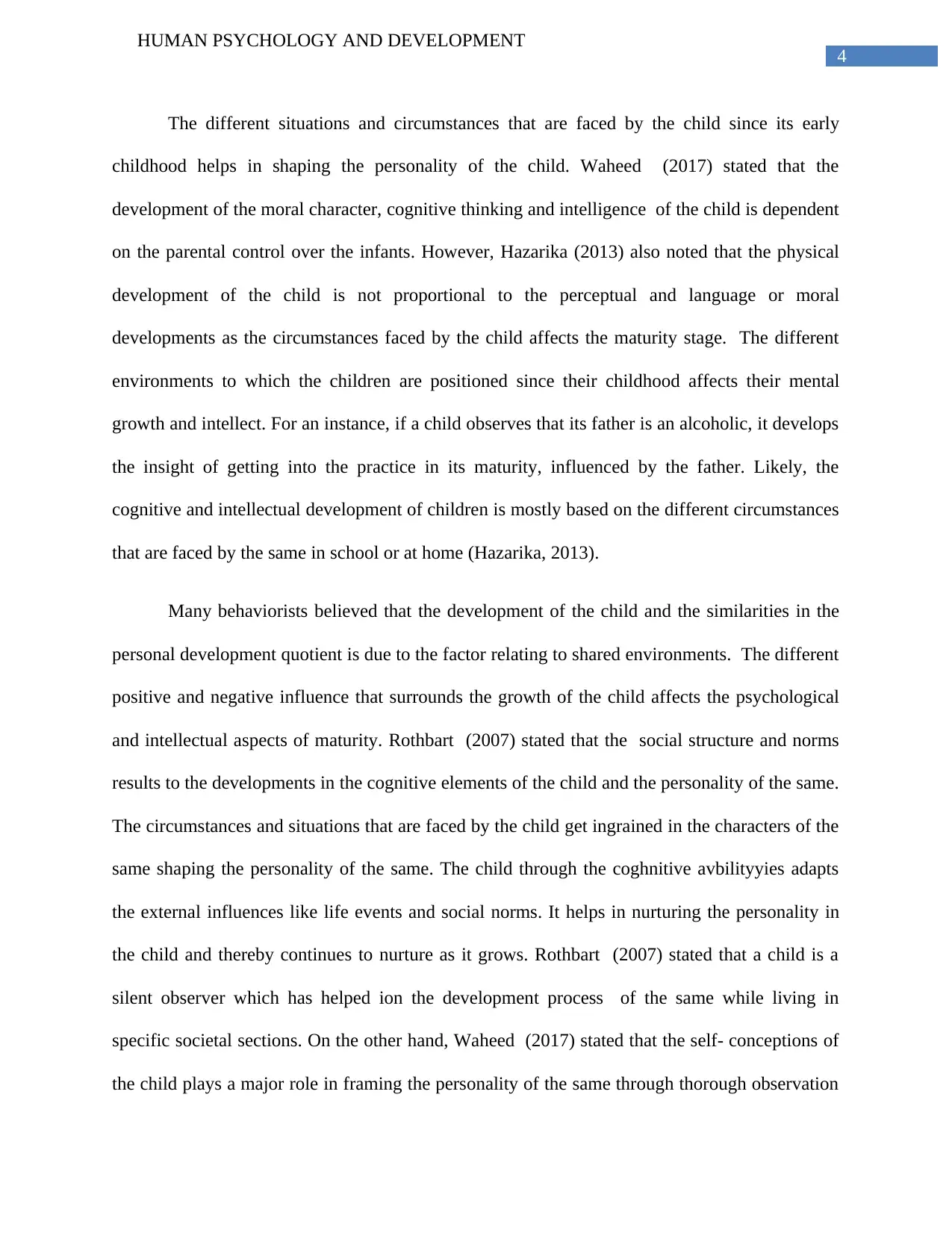
4
HUMAN PSYCHOLOGY AND DEVELOPMENT
The different situations and circumstances that are faced by the child since its early
childhood helps in shaping the personality of the child. Waheed (2017) stated that the
development of the moral character, cognitive thinking and intelligence of the child is dependent
on the parental control over the infants. However, Hazarika (2013) also noted that the physical
development of the child is not proportional to the perceptual and language or moral
developments as the circumstances faced by the child affects the maturity stage. The different
environments to which the children are positioned since their childhood affects their mental
growth and intellect. For an instance, if a child observes that its father is an alcoholic, it develops
the insight of getting into the practice in its maturity, influenced by the father. Likely, the
cognitive and intellectual development of children is mostly based on the different circumstances
that are faced by the same in school or at home (Hazarika, 2013).
Many behaviorists believed that the development of the child and the similarities in the
personal development quotient is due to the factor relating to shared environments. The different
positive and negative influence that surrounds the growth of the child affects the psychological
and intellectual aspects of maturity. Rothbart (2007) stated that the social structure and norms
results to the developments in the cognitive elements of the child and the personality of the same.
The circumstances and situations that are faced by the child get ingrained in the characters of the
same shaping the personality of the same. The child through the coghnitive avbilityyies adapts
the external influences like life events and social norms. It helps in nurturing the personality in
the child and thereby continues to nurture as it grows. Rothbart (2007) stated that a child is a
silent observer which has helped ion the development process of the same while living in
specific societal sections. On the other hand, Waheed (2017) stated that the self- conceptions of
the child plays a major role in framing the personality of the same through thorough observation
HUMAN PSYCHOLOGY AND DEVELOPMENT
The different situations and circumstances that are faced by the child since its early
childhood helps in shaping the personality of the child. Waheed (2017) stated that the
development of the moral character, cognitive thinking and intelligence of the child is dependent
on the parental control over the infants. However, Hazarika (2013) also noted that the physical
development of the child is not proportional to the perceptual and language or moral
developments as the circumstances faced by the child affects the maturity stage. The different
environments to which the children are positioned since their childhood affects their mental
growth and intellect. For an instance, if a child observes that its father is an alcoholic, it develops
the insight of getting into the practice in its maturity, influenced by the father. Likely, the
cognitive and intellectual development of children is mostly based on the different circumstances
that are faced by the same in school or at home (Hazarika, 2013).
Many behaviorists believed that the development of the child and the similarities in the
personal development quotient is due to the factor relating to shared environments. The different
positive and negative influence that surrounds the growth of the child affects the psychological
and intellectual aspects of maturity. Rothbart (2007) stated that the social structure and norms
results to the developments in the cognitive elements of the child and the personality of the same.
The circumstances and situations that are faced by the child get ingrained in the characters of the
same shaping the personality of the same. The child through the coghnitive avbilityyies adapts
the external influences like life events and social norms. It helps in nurturing the personality in
the child and thereby continues to nurture as it grows. Rothbart (2007) stated that a child is a
silent observer which has helped ion the development process of the same while living in
specific societal sections. On the other hand, Waheed (2017) stated that the self- conceptions of
the child plays a major role in framing the personality of the same through thorough observation
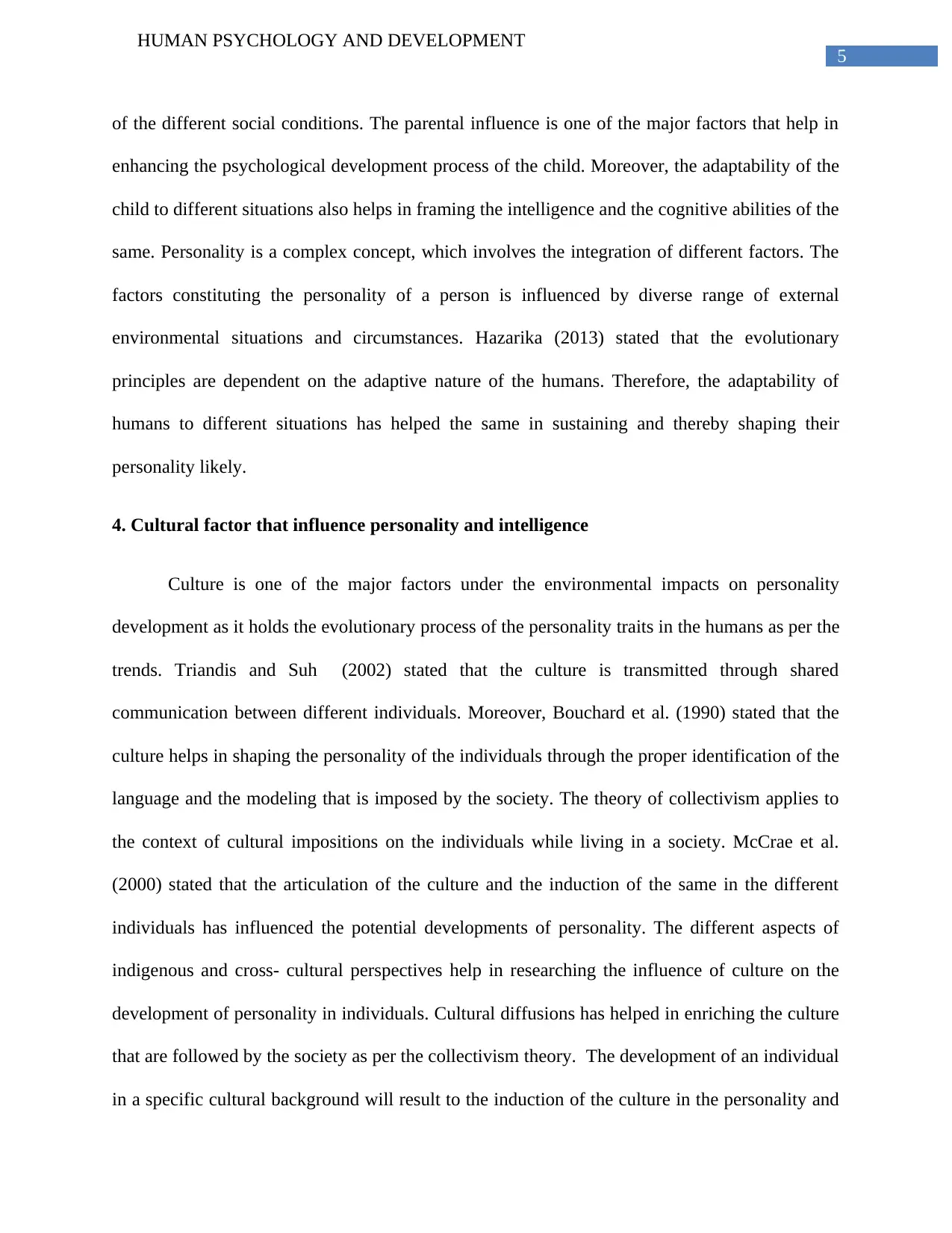
5
HUMAN PSYCHOLOGY AND DEVELOPMENT
of the different social conditions. The parental influence is one of the major factors that help in
enhancing the psychological development process of the child. Moreover, the adaptability of the
child to different situations also helps in framing the intelligence and the cognitive abilities of the
same. Personality is a complex concept, which involves the integration of different factors. The
factors constituting the personality of a person is influenced by diverse range of external
environmental situations and circumstances. Hazarika (2013) stated that the evolutionary
principles are dependent on the adaptive nature of the humans. Therefore, the adaptability of
humans to different situations has helped the same in sustaining and thereby shaping their
personality likely.
4. Cultural factor that influence personality and intelligence
Culture is one of the major factors under the environmental impacts on personality
development as it holds the evolutionary process of the personality traits in the humans as per the
trends. Triandis and Suh (2002) stated that the culture is transmitted through shared
communication between different individuals. Moreover, Bouchard et al. (1990) stated that the
culture helps in shaping the personality of the individuals through the proper identification of the
language and the modeling that is imposed by the society. The theory of collectivism applies to
the context of cultural impositions on the individuals while living in a society. McCrae et al.
(2000) stated that the articulation of the culture and the induction of the same in the different
individuals has influenced the potential developments of personality. The different aspects of
indigenous and cross- cultural perspectives help in researching the influence of culture on the
development of personality in individuals. Cultural diffusions has helped in enriching the culture
that are followed by the society as per the collectivism theory. The development of an individual
in a specific cultural background will result to the induction of the culture in the personality and
HUMAN PSYCHOLOGY AND DEVELOPMENT
of the different social conditions. The parental influence is one of the major factors that help in
enhancing the psychological development process of the child. Moreover, the adaptability of the
child to different situations also helps in framing the intelligence and the cognitive abilities of the
same. Personality is a complex concept, which involves the integration of different factors. The
factors constituting the personality of a person is influenced by diverse range of external
environmental situations and circumstances. Hazarika (2013) stated that the evolutionary
principles are dependent on the adaptive nature of the humans. Therefore, the adaptability of
humans to different situations has helped the same in sustaining and thereby shaping their
personality likely.
4. Cultural factor that influence personality and intelligence
Culture is one of the major factors under the environmental impacts on personality
development as it holds the evolutionary process of the personality traits in the humans as per the
trends. Triandis and Suh (2002) stated that the culture is transmitted through shared
communication between different individuals. Moreover, Bouchard et al. (1990) stated that the
culture helps in shaping the personality of the individuals through the proper identification of the
language and the modeling that is imposed by the society. The theory of collectivism applies to
the context of cultural impositions on the individuals while living in a society. McCrae et al.
(2000) stated that the articulation of the culture and the induction of the same in the different
individuals has influenced the potential developments of personality. The different aspects of
indigenous and cross- cultural perspectives help in researching the influence of culture on the
development of personality in individuals. Cultural diffusions has helped in enriching the culture
that are followed by the society as per the collectivism theory. The development of an individual
in a specific cultural background will result to the induction of the culture in the personality and
⊘ This is a preview!⊘
Do you want full access?
Subscribe today to unlock all pages.

Trusted by 1+ million students worldwide
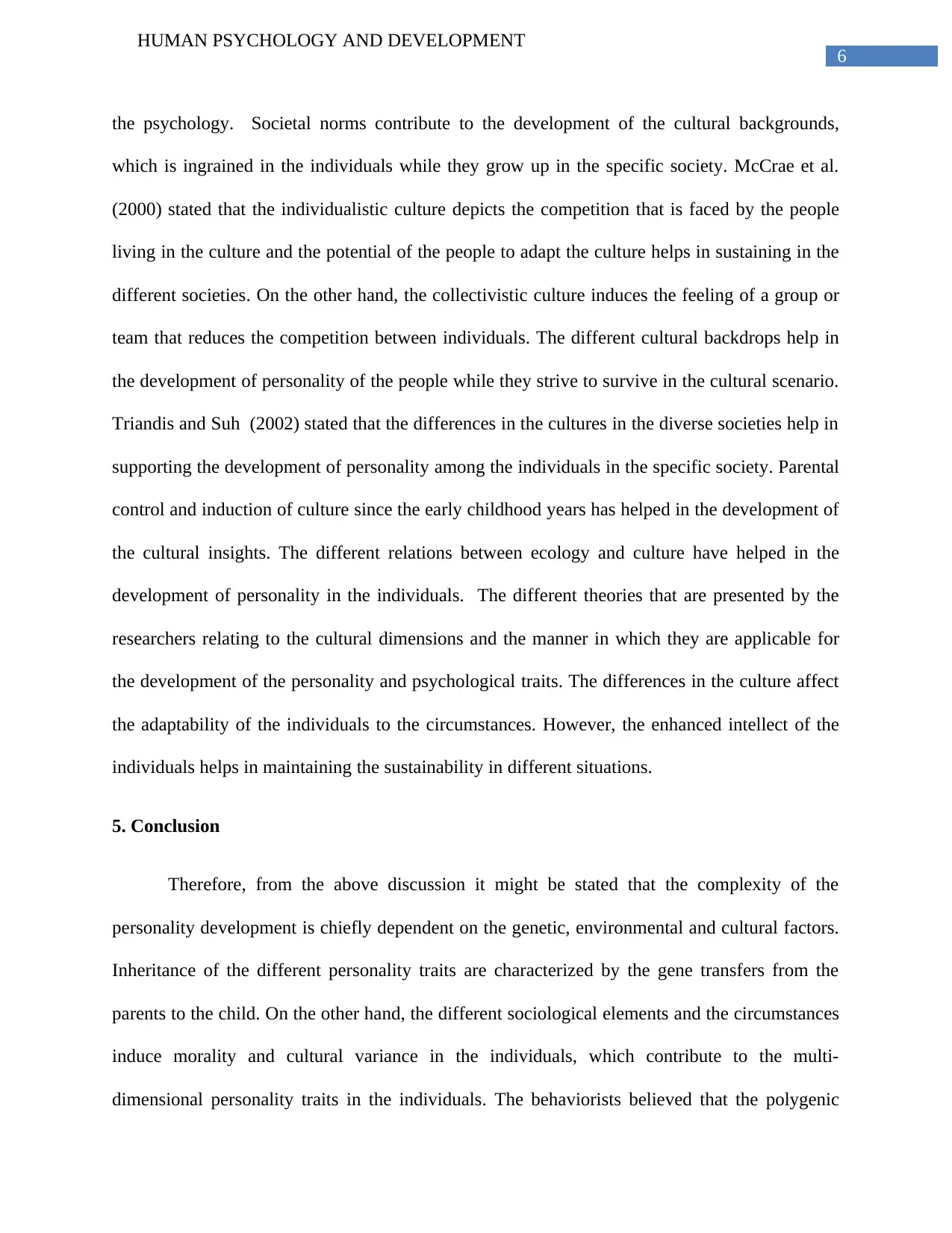
6
HUMAN PSYCHOLOGY AND DEVELOPMENT
the psychology. Societal norms contribute to the development of the cultural backgrounds,
which is ingrained in the individuals while they grow up in the specific society. McCrae et al.
(2000) stated that the individualistic culture depicts the competition that is faced by the people
living in the culture and the potential of the people to adapt the culture helps in sustaining in the
different societies. On the other hand, the collectivistic culture induces the feeling of a group or
team that reduces the competition between individuals. The different cultural backdrops help in
the development of personality of the people while they strive to survive in the cultural scenario.
Triandis and Suh (2002) stated that the differences in the cultures in the diverse societies help in
supporting the development of personality among the individuals in the specific society. Parental
control and induction of culture since the early childhood years has helped in the development of
the cultural insights. The different relations between ecology and culture have helped in the
development of personality in the individuals. The different theories that are presented by the
researchers relating to the cultural dimensions and the manner in which they are applicable for
the development of the personality and psychological traits. The differences in the culture affect
the adaptability of the individuals to the circumstances. However, the enhanced intellect of the
individuals helps in maintaining the sustainability in different situations.
5. Conclusion
Therefore, from the above discussion it might be stated that the complexity of the
personality development is chiefly dependent on the genetic, environmental and cultural factors.
Inheritance of the different personality traits are characterized by the gene transfers from the
parents to the child. On the other hand, the different sociological elements and the circumstances
induce morality and cultural variance in the individuals, which contribute to the multi-
dimensional personality traits in the individuals. The behaviorists believed that the polygenic
HUMAN PSYCHOLOGY AND DEVELOPMENT
the psychology. Societal norms contribute to the development of the cultural backgrounds,
which is ingrained in the individuals while they grow up in the specific society. McCrae et al.
(2000) stated that the individualistic culture depicts the competition that is faced by the people
living in the culture and the potential of the people to adapt the culture helps in sustaining in the
different societies. On the other hand, the collectivistic culture induces the feeling of a group or
team that reduces the competition between individuals. The different cultural backdrops help in
the development of personality of the people while they strive to survive in the cultural scenario.
Triandis and Suh (2002) stated that the differences in the cultures in the diverse societies help in
supporting the development of personality among the individuals in the specific society. Parental
control and induction of culture since the early childhood years has helped in the development of
the cultural insights. The different relations between ecology and culture have helped in the
development of personality in the individuals. The different theories that are presented by the
researchers relating to the cultural dimensions and the manner in which they are applicable for
the development of the personality and psychological traits. The differences in the culture affect
the adaptability of the individuals to the circumstances. However, the enhanced intellect of the
individuals helps in maintaining the sustainability in different situations.
5. Conclusion
Therefore, from the above discussion it might be stated that the complexity of the
personality development is chiefly dependent on the genetic, environmental and cultural factors.
Inheritance of the different personality traits are characterized by the gene transfers from the
parents to the child. On the other hand, the different sociological elements and the circumstances
induce morality and cultural variance in the individuals, which contribute to the multi-
dimensional personality traits in the individuals. The behaviorists believed that the polygenic
Paraphrase This Document
Need a fresh take? Get an instant paraphrase of this document with our AI Paraphraser
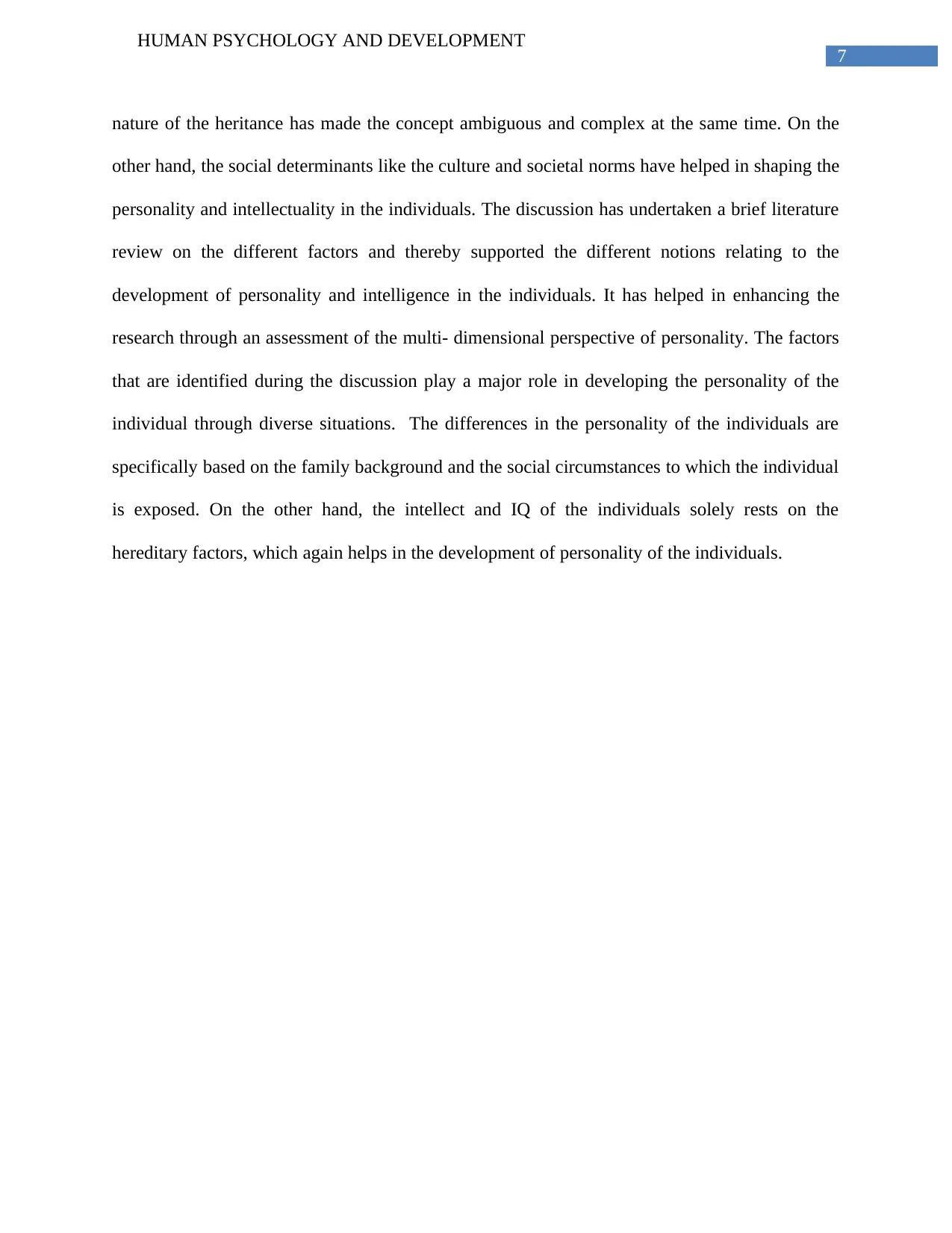
7
HUMAN PSYCHOLOGY AND DEVELOPMENT
nature of the heritance has made the concept ambiguous and complex at the same time. On the
other hand, the social determinants like the culture and societal norms have helped in shaping the
personality and intellectuality in the individuals. The discussion has undertaken a brief literature
review on the different factors and thereby supported the different notions relating to the
development of personality and intelligence in the individuals. It has helped in enhancing the
research through an assessment of the multi- dimensional perspective of personality. The factors
that are identified during the discussion play a major role in developing the personality of the
individual through diverse situations. The differences in the personality of the individuals are
specifically based on the family background and the social circumstances to which the individual
is exposed. On the other hand, the intellect and IQ of the individuals solely rests on the
hereditary factors, which again helps in the development of personality of the individuals.
HUMAN PSYCHOLOGY AND DEVELOPMENT
nature of the heritance has made the concept ambiguous and complex at the same time. On the
other hand, the social determinants like the culture and societal norms have helped in shaping the
personality and intellectuality in the individuals. The discussion has undertaken a brief literature
review on the different factors and thereby supported the different notions relating to the
development of personality and intelligence in the individuals. It has helped in enhancing the
research through an assessment of the multi- dimensional perspective of personality. The factors
that are identified during the discussion play a major role in developing the personality of the
individual through diverse situations. The differences in the personality of the individuals are
specifically based on the family background and the social circumstances to which the individual
is exposed. On the other hand, the intellect and IQ of the individuals solely rests on the
hereditary factors, which again helps in the development of personality of the individuals.
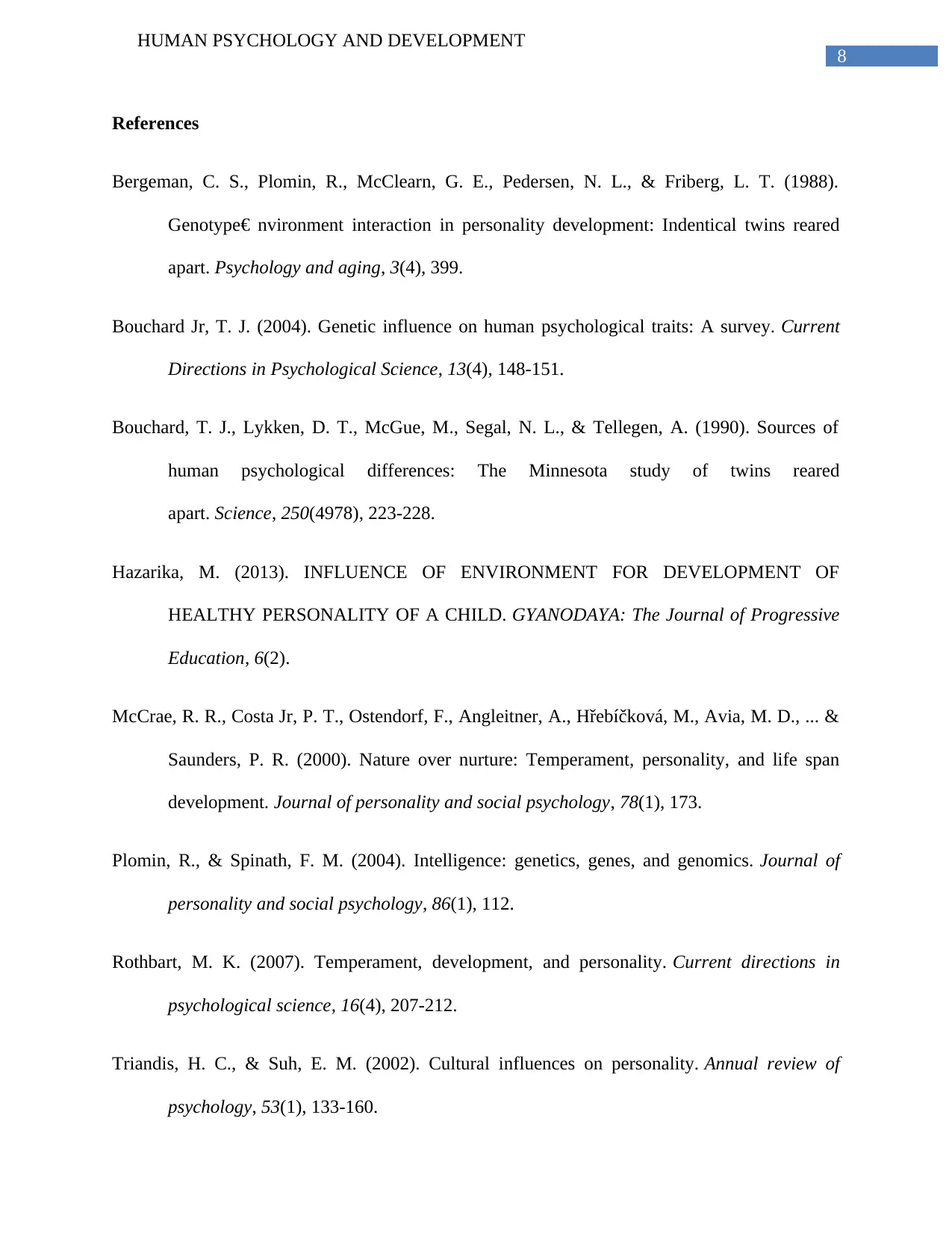
8
HUMAN PSYCHOLOGY AND DEVELOPMENT
References
Bergeman, C. S., Plomin, R., McClearn, G. E., Pedersen, N. L., & Friberg, L. T. (1988).
Genotype€ nvironment interaction in personality development: Indentical twins reared
apart. Psychology and aging, 3(4), 399.
Bouchard Jr, T. J. (2004). Genetic influence on human psychological traits: A survey. Current
Directions in Psychological Science, 13(4), 148-151.
Bouchard, T. J., Lykken, D. T., McGue, M., Segal, N. L., & Tellegen, A. (1990). Sources of
human psychological differences: The Minnesota study of twins reared
apart. Science, 250(4978), 223-228.
Hazarika, M. (2013). INFLUENCE OF ENVIRONMENT FOR DEVELOPMENT OF
HEALTHY PERSONALITY OF A CHILD. GYANODAYA: The Journal of Progressive
Education, 6(2).
McCrae, R. R., Costa Jr, P. T., Ostendorf, F., Angleitner, A., Hřebíčková, M., Avia, M. D., ... &
Saunders, P. R. (2000). Nature over nurture: Temperament, personality, and life span
development. Journal of personality and social psychology, 78(1), 173.
Plomin, R., & Spinath, F. M. (2004). Intelligence: genetics, genes, and genomics. Journal of
personality and social psychology, 86(1), 112.
Rothbart, M. K. (2007). Temperament, development, and personality. Current directions in
psychological science, 16(4), 207-212.
Triandis, H. C., & Suh, E. M. (2002). Cultural influences on personality. Annual review of
psychology, 53(1), 133-160.
HUMAN PSYCHOLOGY AND DEVELOPMENT
References
Bergeman, C. S., Plomin, R., McClearn, G. E., Pedersen, N. L., & Friberg, L. T. (1988).
Genotype€ nvironment interaction in personality development: Indentical twins reared
apart. Psychology and aging, 3(4), 399.
Bouchard Jr, T. J. (2004). Genetic influence on human psychological traits: A survey. Current
Directions in Psychological Science, 13(4), 148-151.
Bouchard, T. J., Lykken, D. T., McGue, M., Segal, N. L., & Tellegen, A. (1990). Sources of
human psychological differences: The Minnesota study of twins reared
apart. Science, 250(4978), 223-228.
Hazarika, M. (2013). INFLUENCE OF ENVIRONMENT FOR DEVELOPMENT OF
HEALTHY PERSONALITY OF A CHILD. GYANODAYA: The Journal of Progressive
Education, 6(2).
McCrae, R. R., Costa Jr, P. T., Ostendorf, F., Angleitner, A., Hřebíčková, M., Avia, M. D., ... &
Saunders, P. R. (2000). Nature over nurture: Temperament, personality, and life span
development. Journal of personality and social psychology, 78(1), 173.
Plomin, R., & Spinath, F. M. (2004). Intelligence: genetics, genes, and genomics. Journal of
personality and social psychology, 86(1), 112.
Rothbart, M. K. (2007). Temperament, development, and personality. Current directions in
psychological science, 16(4), 207-212.
Triandis, H. C., & Suh, E. M. (2002). Cultural influences on personality. Annual review of
psychology, 53(1), 133-160.
⊘ This is a preview!⊘
Do you want full access?
Subscribe today to unlock all pages.

Trusted by 1+ million students worldwide

9
HUMAN PSYCHOLOGY AND DEVELOPMENT
Waheed, I. (2017). Parents’ Personality, Family Environment and Pakistani Adolescents’
Personality Iqra Waheed,* Saira Batool, and Rukhsana Kausar, PhD Institute of Applied
Psychology, University of the Punjab, Lahore, Pakistan. Journal of Behavioural
Sciences, 27(1).
HUMAN PSYCHOLOGY AND DEVELOPMENT
Waheed, I. (2017). Parents’ Personality, Family Environment and Pakistani Adolescents’
Personality Iqra Waheed,* Saira Batool, and Rukhsana Kausar, PhD Institute of Applied
Psychology, University of the Punjab, Lahore, Pakistan. Journal of Behavioural
Sciences, 27(1).
1 out of 10
Related Documents
Your All-in-One AI-Powered Toolkit for Academic Success.
+13062052269
info@desklib.com
Available 24*7 on WhatsApp / Email
![[object Object]](/_next/static/media/star-bottom.7253800d.svg)
Unlock your academic potential
Copyright © 2020–2026 A2Z Services. All Rights Reserved. Developed and managed by ZUCOL.




